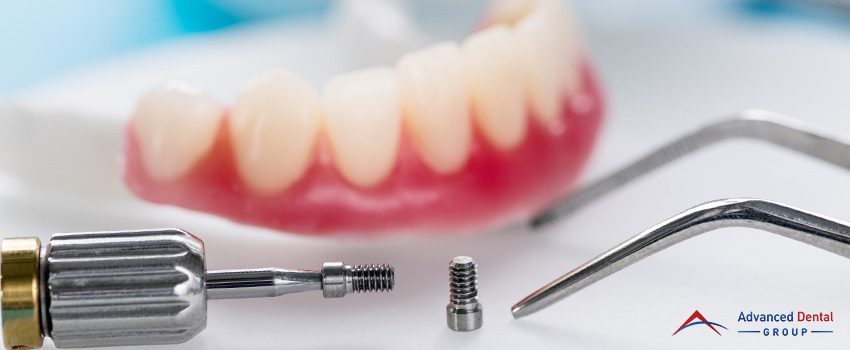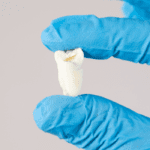A dental implant feels and looks like a natural tooth.
Dental implants address oral problems caused by one or more missing teeth. By surgically placing tooth roots and fusing titanium to your jawbone, they function just like the real thing. They protect the bone, support healthy bites, keep each tooth in place, and prevent jaw deterioration.
How To Prepare for Dental Implants
Preparing for dental implant treatment requires knowledge of what to expect and determination. The treatment involves several procedures with healing time in between.
The following are the stages you would need to go through:
- Removal of the damaged tooth
- Bone grafting (if needed)
- Implant placement (either endosteal or subperiosteal)
- Endosteal implants are small screws inserted into the jawbone.
- Subperiosteal implants are placed on the bone as an option when there is no healthy jawbone. Unlike endosteal implants, these are placed under the gum.
- Growth and healing of the bones
- Abutment placement or metal extender to connect the tooth to the implant
- Tooth placement (done after the healing process)
Treatment Plan
The treatment plan generally requires different specialists – periodontists, oral and maxillofacial surgeons, prosthodontists, and, if needed, ear, nose, and throat specialists.
They will thoroughly evaluate the following:
- Medical History: You would need to inform your dentist of your current and past medical conditions, which would include medications (both prescribed and over-the-counter), implants, heart conditions, and past surgeries. These are all necessary to evaluate the medications you would need before the procedure and precautions they need to take if needed.
- Dental Exam: A comprehensive examination of your teeth and jaw, though dental X-rays and 3D images are needed to closely inspect the underlying problems.
After getting all the necessary information, your dental provider will create a treatment plan for your needs, depending on the condition of your oral health.
What To Ask Before Getting Dental Implants
It is common to get anxious before getting any surgical procedure. Asking and knowing the key points surrounding the treatment will help manage expectations and anxiety.
Here are some answers to common concerns:
1. Is the procedure safe?
Yes. With today’s implant technology, and as long as the dental provider sees you are a fit for the treatment, the procedure itself is safe. As with any other surgery, there is a risk of infection, nerve damage, sinus problems, or injury to surrounding tissues. There is nothing to worry about; these are considered minor problems that are easily treated and rarely occur.
2. How successful is the procedure?
In general, the success rate of dental implants is as high as 98%. With advancements in technology and skilled dentists, it has become a common dental procedure.
3. What happens if the bone fails to fuse?
The dental implants will be removed and cleaned. After three months, you may try the procedure again.
4. What is the timeline?
Several steps and appointments mentioned earlier typically run between three to nine months, depending on your oral health and condition.
5. Is the procedure painful?
The procedure includes anesthesia to control the pain. Depending on the assessment, anesthesia may be local, general, or IV sedation. Many patients report only a little discomfort during the procedure, compared to what they were expecting.
What To Do Before Dental Implant Surgery
Just before the dental implant procedure, you will be instructed with the following:
- A few days before the procedure, you will be prescribed to take certain antibiotics to prevent implant problems.
- On the day of the procedure, you will be asked to rinse with an anti-bacterial mouthwash.
- If IV sedation is used, you will not be allowed to eat past midnight. Your stomach needs to be empty during the procedure.
- If the procedure is done under local anesthesia, you may have a light meal hours before the procedure.
What To Expect After the Treatment and Home Care
- You may experience pain, bleeding, bruising, and swelling at every stage of treatment. If these symptoms get worse, contact your dentist.
- Soft foods and soup are all you can have while healing.
- Pain relievers will be prescribed to manage pain.
- Antibiotics will also be prescribed when deemed necessary.
Good dental hygiene is needed to make dental implants last longer. Though they will not decay, they are still affected by periodontal disease. Brush your teeth thoroughly twice a day, floss in between teeth, avoid bad oral habits, and adhere to follow-up appointments.
Where To Get Dental Implants?
If you have been looking for a reliable dental clinic to get your dental implants, you have come to the right place. We at Advanced Dental Group have partnered with the best and most skilled dentists in your area and will connect you to them! Contact us today for more information.





